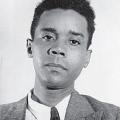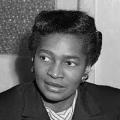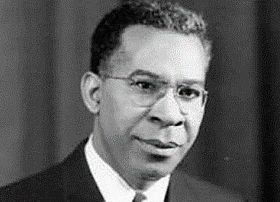91. Massa Day Done: Oliver Cox and Eric Williams
Two Trinidadian political thinkers: sociologist Oliver Cox analyzes the nature of racial prejudice, and historian Eric Williams connects capitalism to slavery.
Themes:
• O.C. Cox, Caste, Class, and Race: A Study in Social Dynamics (New York: 1948).
• O.C. Cox, The Foundations of Capitalism (New York: 1959).
• O.C. Cox, Capitalism and American Leadership (New York: 1962).
• O.C. Cox, Capitalism as a System (New York: 1964).
• O.C. Cox, Race Relations: Elements and Social Dynamics (Detroit: 1976).
• C.L.R. James, Party Politics in the West Indies (San Juan: 1962).
• E. Williams, The Negro in the Caribbean (Washington, D.C.: 1942).
• E. Williams, Capitalism and Slavery (Chapel Hill: 1944).
• E. Williams, Education in the British West Indies (Port of Spain: 1950).
• E. Williams, British Historians and the West Indies (Port of Spain: 1964).
• E. Williams, Inward Hunger: The Education of a Prime Minister (London: 1969).
• E. Williams, Eric E. Williams Speaks, ed. S.R. Cudjoe (Wellesley, MA: 1993).
---
• D. Benn, The Caribbean: An Intellectual History, 1774-2003 (Kingston: 2004).
• A.Q. Cheeseboro, "Conflict and Continuity: E. Franklin Frazier, Oliver C. Cox and the Chicago School of Sociology," Journal of the Illinois State Historical Society 92 (1999), 150-172.
• R.M. Cooke, "The Historian As Underdog: Eric Williams and the British Empire," The Historian 33 (1971), 596-610.
• S. Drescher, "Eric Williams: British Capitalism and British Slavery," History and Theory 26 (1987), 180-96.
• C. Høgsbjerg, C.L.R. James in Imperial Britain (Durham, NC: 2014).
• H.M. Hunter, "Oliver C. Cox: A Biographical Sketch of His Life and Work," Phylon 44 (1983), 249-261.
• S.E. Klarlund, "The Origins of Racism: The Critical Theory of Oliver C. Cox," Mid-American Review of Sociology 18 (1994), 85-92.
• W. Look Lai, "C.L.R. James and Trinidadian Nationalism," in P. Henry and Paul Buhle (eds), C.L.R. James's Caribbean (Durham, NC: 1992).
• C. McCauley, The Mind of Oliver C. Cox (Notre Dame: 2004).
• C.A. Palmer, Eric Williams and the Making of the Modern Caribbean (Durham, NC: 2009).
• A. Parasram, "Capitalism and Slavery as a Decolonial Text: Looking Back to Look Forward," in K. Freeman and J. Munro (eds), Reading the Postwar Future: Textual Turning Points from 1944 (London: 2020), 113-128.
• R. Ramcharitar, "The Monad: The Hegemony of Personality - Eric Williams and the Post Independence Imagination of Trinidad, 1956-1981," Caribbean Quarterly 58 (2012), 44-64.
• C.J. Robinson, "Capitalism, Slavery and Bourgeois Historiography," History Workshop 23 (1987), 122-140.






Comments
Capitalism & Slavery: Investment, not Profit
The criticism that "... its accounts of slavery's profitability to England [...] cannot stand up to empirical scrutiny" is a strawman argument propagated in Western academia, which I once personally came across on an online history course conducted by Columbia University. Indeed, other colonies of the British Empire such as India were vastly more profitable, but diverts from the case Williams was arguing that the proceeds of slavery was reinvested into modernising production by many a big name even of our day. These disrupting efforts seeded the Industrial Revolution (acting in tandem with deliberations like parliamentary enclosure), superceding and rendering obsolete the institution of slavery nevertheless at its height/peak at the end of the 18th century. The well-documented investors and numbers Williams drew from archival records served to leverage a multiplier effect and a momentum that did not require vast extractive profits derived from other colonies.
His case demonstrated the power of investment, not profit. Indeed much of those so-called profits were actually compensations gained from the dismantling of West Indian slavery, which would undergird Williams motivations for reparations. While on the topic of developmental alternatives, it would be of interest to note that the neoliberal path Williams eventually embarked on around the time of the Chaguaramas deal and the opening up of the oil industry reflected the popular economic philosophy of "industralisation by invitation" expounded by another Caribbean figure, Arthur Lewis.
Overall, an excellent introduction and summary of Williams! Almost perfect "Williams in a nutshell"! Kudos. I'm grateful for bringing my attention to Oliver Cox as well.
In reply to Capitalism & Slavery: Investment, not Profit by Gerard David
Investment
Wow, that is really interesting and informative! Thanks, I think this clarifies his position very helpfully.
Rounding out Williams
As follow-up, a detailed overview 'Enslavement and Industrialisation' from the BBC online series on British history expands upon the study pioneered by Williams' 'Capitalism and Slavery'.
Add new comment